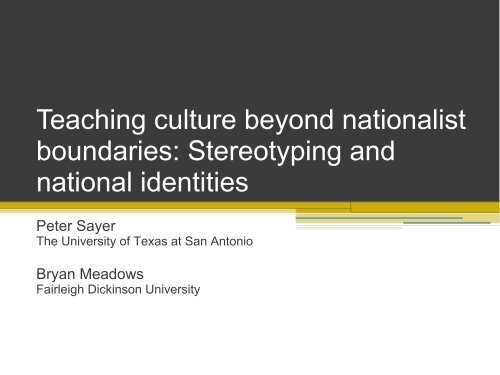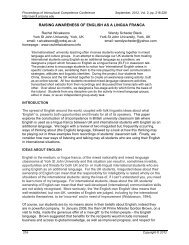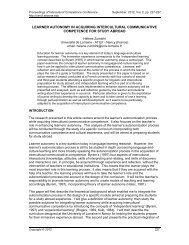Teaching culture beyond nationalist boundaries ... - CERCLL
Teaching culture beyond nationalist boundaries ... - CERCLL
Teaching culture beyond nationalist boundaries ... - CERCLL
Create successful ePaper yourself
Turn your PDF publications into a flip-book with our unique Google optimized e-Paper software.
<strong>Teaching</strong> <strong>culture</strong> <strong>beyond</strong> <strong>nationalist</strong><br />
<strong>boundaries</strong>: Stereotyping and<br />
national identities<br />
Peter Sayer<br />
The University of Texas at San Antonio<br />
Bryan Meadows<br />
Fairleigh Dickinson University
Controversial statements as a casein-point<br />
for intercultural awareness<br />
• Controversial incident on BBC show<br />
• The response: Discourse generated by<br />
controversy<br />
• Analyze textual series: Nationalist<br />
stereotypes and humor<br />
• Incident as case-in-point for intercultural<br />
teaching
Top Gear<br />
• Automotive show produced by<br />
the British Broadcasting<br />
Corporation (BBC)<br />
• Viewed in 100+ countries<br />
• 1,000,000 viewers<br />
• Won 2010 National TV Awards<br />
for “Most Popular Factual<br />
Show”<br />
• Three hosts discuss, test, and<br />
evaluate cars using abrasive<br />
humor
The Mexican car<br />
controversy<br />
• January 2011 Top Gear reviews<br />
the Mastretta<br />
• Excerpt rebroadcast in Mexican<br />
media and blogs<br />
• Today: Look at the original clip<br />
• Shed light on the role of<br />
nationalism in shaping<br />
commonplace conceptions of<br />
'<strong>culture</strong>'.<br />
• What are the implications for<br />
teaching intercultural awareness<br />
in language education
January 2011 episode of Top Gear<br />
(see handout)
Analysis<br />
A critical language pedagogy approach (Norton & Toohey 2004; Osborn<br />
2006) in order to...<br />
...provide an account of how nationalism gives structure to the<br />
discourse that develops surrounding the TV episode.<br />
…in so doing, shed light on the prominent position of nationalism to<br />
shape commonplace understandings of <strong>culture</strong> – in that it circulates<br />
covertly as the commonsense.
Data for Analysis<br />
Three inter-related texts:<br />
1. the TopGear episode<br />
2. BBC public pronouncement, and<br />
3. online discussions regarding the episode.
Nationalism<br />
Post-structuralist turn to the social sciences has recast<br />
'nationalism' as an...<br />
• ideology of social organization that privileges a global<br />
patchwork of discrete nations, each one internally coherent<br />
and externally distinct from one another (Billig 1995, Kedourie 2000,<br />
Meadows 2010).
Text One: How does <strong>nationalist</strong> ideology<br />
shape the TopGear exchange<br />
Two premises are at play in the TopGear exchange:<br />
1. one may organize humanity into discrete unique 'nations'<br />
2. one may map such nationalized characteristics to nonhuman<br />
objects
Text Two: A defense of the <strong>nationalist</strong><br />
commonsense<br />
The BBC public pronouncement not only takes up the<br />
<strong>nationalist</strong> premises, but acts to defend them.<br />
Rhetorical organization:<br />
1. disparaging remarks about individuals is NOT okay<br />
2. disparaging remarks about groups of people (‘nations’) IS<br />
okay<br />
3. Not only is this okay, we take such acts as characteristic of<br />
our ‘nation’.<br />
(i.e., nationalize the very humor itself.)
Text Three: Online discussions keep<br />
the <strong>nationalist</strong> premises intact<br />
Line of argument: Nationalist accuracy<br />
1. If it's true then it's not slander<br />
2. But Top Gear statements were untrue!<br />
Both sides grounded in referentialism (Hill 2008)<br />
Line of argument: Personal intention<br />
1. they meant no harm!<br />
2. intention or not, stereotypes are harmful<br />
Both sides grounded in personalism (Hill 2008)
Analysis conclusions<br />
Two <strong>nationalist</strong> premises give structure to the discourse.<br />
Notably, the basic premises of nationalism are never<br />
challenged.<br />
The parallels to racist humor are undeniable. (The Top Gear episode<br />
as a parallel case-in-point.)<br />
Next, we will re-frame the episode and resulting discourse for<br />
the pedagogical potential that lies underneath.
Incident as case-in-point for<br />
intercultural teaching<br />
A <strong>nationalist</strong> worldview—<strong>nationalist</strong> in the sense of<br />
being based around the unit of the nation-state—<br />
imposes a solid bond between language, <strong>culture</strong>,<br />
and nationality. A process that casts doubt on this<br />
worldview relaxes those bonds and invites us to<br />
reassess the connection between a target language<br />
and target community. (Ryan 2006: 27)<br />
How can we use the Top Gear controversy to get<br />
students to think about the underlying assumptions<br />
of national stereotypes
The “targets” of L2 teaching<br />
• Language = Culture<br />
• Culture = Nation<br />
• Language = Culture = Nation<br />
• Target L = Target C = Target N<br />
• 1 : 1 : 1 that glosses multilingualism<br />
and multiculturalism
The “targets” of L2 teaching<br />
• Dissatisfaction with both “Food & Festivities”<br />
and “National Norms” approach to <strong>culture</strong><br />
• “Othering” and “essentializing” of (target)<br />
<strong>culture</strong>s in language teaching<br />
• McKay & Bokhorst-Heng (2008): Sociallysensitive<br />
EIL pedagogy<br />
• Dervin (2011): A dialogic engagement that<br />
goes <strong>beyond</strong> “cultural essences”
Culture as sociocultural practice<br />
• Street: Not what <strong>culture</strong> is, but rather what<br />
<strong>culture</strong> does<br />
• “Culture is an active process of meaning<br />
making and contest over definition, including<br />
its own definition. This, then, is what I mean<br />
by arguing that <strong>culture</strong> is a verb” (Street,<br />
1993, p. 25).<br />
• So… shift students’ view towards <strong>culture</strong>s<br />
and languages and nations as social<br />
practices
Langua<strong>culture</strong><br />
• Langua<strong>culture</strong> (Agar, 1994, from Friedrich’s lingua<strong>culture</strong>).<br />
• Risager (2006): Langua<strong>culture</strong> recognizes both bounded<br />
nature of language and <strong>culture</strong>, but also that they are<br />
elements that do not belong to each other.<br />
• Example: A German lesson on the Tour de France taught in<br />
Denmark.<br />
• “In foreign- and second-language teaching a multidimensional<br />
linguistic and cultural contact will, in all<br />
circumstances, be involved, one in which sex, social class,<br />
life experiences and mastery of language will be able to<br />
play a role” (Risager, 2006, p. 24).
Other approaches to L2 <strong>culture</strong><br />
• Lazarton (2003): , students discussed local laws<br />
about being governor, drug use and drug<br />
trafficking, and Catholic religious practices. In each<br />
case, the cultural content was less about national<br />
<strong>culture</strong>s than about aspects of (sub)cultural<br />
practices of particular social groups.<br />
• Roberts et al. (2001) propose a pedagogy that<br />
casts the students as ethnographers.<br />
• Teacher’s role: not to teach <strong>culture</strong>, but rather to<br />
problematize it
<strong>Teaching</strong> <strong>culture</strong> <strong>beyond</strong> <strong>nationalist</strong><br />
<strong>boundaries</strong>: Stereotyping and<br />
national identities<br />
Peter Sayer<br />
The University of Texas at San Antonio<br />
peter.sayer@utsa.edu<br />
Bryan Meadows<br />
Fairleigh Dickinson University<br />
meadowsb@fdu.edu





